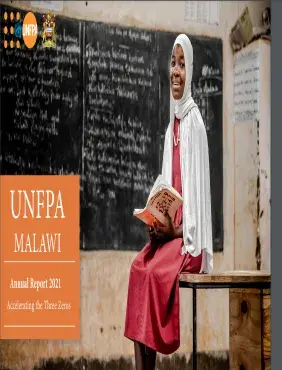The year 2021 was a period of continued global insecurity fuelled by Covid-19. We are now in our third year of the pandemic and learning to live with Covid-19 still appears to be far off on the horizon for much of the globe. With only 4.5 percent of the population fully vaccinated, levels of protection remain very low in Malawi. It is, however, hopefully a sign of relief that our world health experts are starting to indicate we may be seeing some light at the end of the tunnel. The wider and long-term impact of the pandemic on women, adolescent girls and young people should not, however, be underestimated. It has affected the economy, livelihoods and social life in profound ways.
I am proud to say that UNFPA and our partners in Malawi have demonstrated remarkable flexibility and resilience to live with Covid-19. There has inevitably been some impact on our programming, but after a period of adjustment, 2021 witnessed a return to full programme delivery. Our results in 2021 highlight the continued challenges of maintaining the gains in sexual and reproductive health and rights for women, adolescent girls and young people in the face of strained public resources allocated to the health sector and continued instability during the threat of a pandemic.
All of our programmes have mainstreamed Covid-19 prevention measures that have mitigated against contagion. As importantly, these also helped overcome fears that facilities such as health centres could be hotspots for the spread of the virus. With these measures in place, our support for the sexual and reproductive health and rights of women and girls continues to have an impact. We have also expanded the safe space programmes to Dedza, Ntchinji and Lilongwe districts in 2021. These provide opportunities for girls and young women to discuss issues affecting decisions about their bodies and lives. Key to the agenda in these spaces is to combat sexual and gender-based violence, highlight issues around sexual and reproductive health and rights and gender inequality. The girls participating in these safe spaces build mutual support networks for them to lead changes and respond to a wide range of challenges collectively.
The support for safe births and fistula repair, as well as youth empowerment programmes to provide improved opportunities for vulnerable teenagers and health and referral system strengthening schemes are also all demonstrating strong results. In 2022, a new dynamic period for UNFPA will start with the introduction of a new corporate strategic plan for the period 2022- 2025. This plan’s primary aim is to accelerate the three transformative results: accelerating the attainment of ending the unmet need for family planning, ending preventable maternal deaths; and the final one ending gender-based violence and harmful practices.
UNFPA Malawi will accelerate by innovative strategies the attainment of our key outcomes. We will also increase strategic focus on leaving no one behind and the continued urgency in reversing gender inequality and discrimination against women. To ensure the country programme continues to be context driven, we have concluded a wide-ranging review of our strategies that will accelerate the delivery of the three transformative results. This has ensured that our programming is fully aligned with the agenda outlined in Malawi 2063 and the 10-year implementation plan’s development targets, especially those on universal access to sexual and reproductive health and rights.
Won Young Hong UNFPA Resident Representative Malawi


